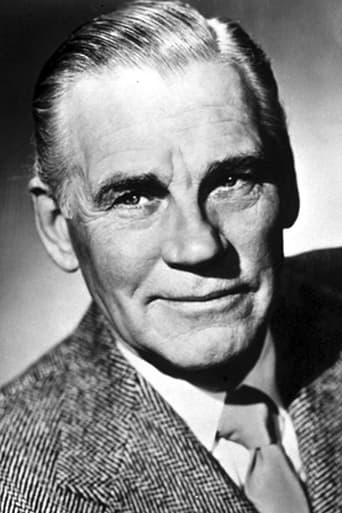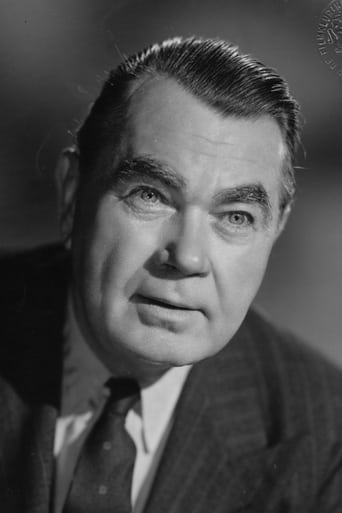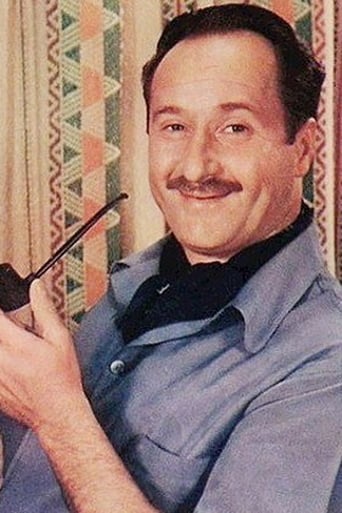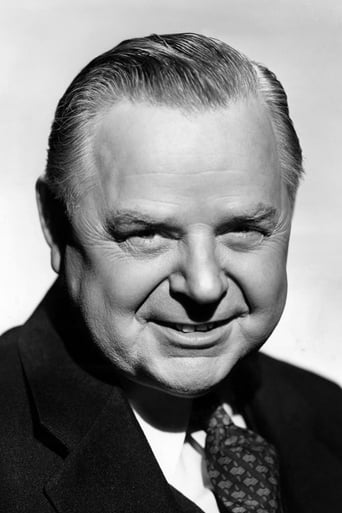SimonJack
What nation in history conducted a propaganda campaign to glorify another nation that it would then spend hundreds of billions of dollars to defend itself against? Or that would spend more than $5 trillion in a nuclear arms race? To those reading this review, the answer is obvious. The U.S. is the only country ever to produce so much propaganda in support of another nation that would soon oppose it. And, that's one of the unique things about this film. "Mission to Moscow" was the first of several Hollywood films to portray Soviet Russia as our good neighbor. The second thing about the film is that it was a sham.This isn't to knock propaganda, which has been used forever. For a good discussion of propaganda and its use, see the review by jacksflicks from Hollywood on April 6, 2004. The performances and film qualities of this movie are okay, but nothing special. It has a cast of prominent actors, as do most of the films that followed. But, why was a major propaganda effort launched then? Warner Brothers made this film at the behest of Pres. Franklin D. Roosevelt. He wanted a movie made from the book by his former ambassador, Walter Davies. That book glamorized the Soviet Union in 1938. But it was a lie, and FDR knew it. Davies supervised the script and everything about the film. The War Department then prevailed on other Hollywood studios to make pro- Soviet movies. After "Mission to Moscow" came out on April 28, 1943, a string of films followed. Columbia released "The Boy from Stalingrad" on May 20 of that year. Samuel Goldwyn and RKO Pictures put out "The North Star" on Nov. 4. The U.S. War Department made a full-length documentary on Nov. 11 that was filmed by a U.S. Army unit in Russia. Three more full-length Hollywood films followed in 1944: "Three Russian Girls" by United Artists on Jan. 14, "Song of Russia" by MGM on February 10, and "Days of Glory" by RKO on June 16, 1944.Most of these films are just fair. But they are unlike any of the other war films being made about resistance fighters and underground forces in other countries. These clearly are propaganda films. But why were they being made by the U.S. to promote another country way into the war? We no longer needed to build American support for Russia, or to urge the Soviets to enter the war on our side. We already had both.Russia was in the war since Germany invaded it on June 22, 1941. It now made the second front that the Allies wanted. England had been sending armaments and supplies to Russia. And, the Russians had stalled the Germans since Aug. 23, 1942, and then defeated them in the Battle of Stalingrad on Feb. 2, 1943. The Allies were winning elsewhere. Germany had lost the Battle of Britain in 1940, and it was fast losing the air war everywhere. The Allies had been bombing Berlin since 1940. They defeated the Germans at the Second Battle of El Alamein on Nov. 11, 1942, and German surrender in Africa would come on May 13, 1943. That was just nine days before this film was released. So, there clearly was no need for a new propaganda push by the U.S. in support of Soviet Russia. Unless there were other reasons FDR wanted Americans to have friendly feelings toward the Soviets? Because, once Germany was defeated, public concern would then turn its gaze on communism. So, if Americans would not be wary of Russia, there probably wouldn't be much concern about Europe after the war. Germany, of course, being the exception. Well, that's how it turned out. Winston Churchill coined the phrase "Iron Curtain" for the Soviet domination of Eastern Europe. That was in a speech he gave on March 5, 1946, at Westminster College in Fulton, Missouri. Churchill had been a strong advocate for the freedom of eastern Europe after the war, especially Poland. Some 200,000 Polish soldiers were serving under the British Army. The Yalta Conference of February 4-11, 1945, was to determine the fate of Europe after the war. It was supposed to give self-determination to the people liberated from Nazi Europe. FDR, Churchill and Stalin all agreed to this.But FDR granted concessions to the Soviets, and Churchill went along. Stalin put in place communist governments in all of Eastern Europe. Poland, Czechoslovakia, Hungary, Yugoslavia, the Baltic States and others would now be part of the Soviet Union, along with East Germany. Stalin hoodwinked the Allies and they didn't lift a finger to stop him. The Allies gave the shaft to the people of Eastern Europe. Was Gen. George Patton right after all – about the Soviets?Many in England saw this as a betrayal of Poland. It likely contributed to Churchill's election loss at war's end. At the Potsdam Conference in July, the Soviets denied that they were interfering in the affairs of Romania, Bulgaria and Hungary. And that was that. Back in the U.S., little care was paid to the fate of the Eastern Europeans. After all, everyone knew how good, decent and trustworthy the Soviets were. We had seen it in all these films and our government, Hollywood and the news media wouldn't lie to us, would they?Just think! If all those countries freely had been able to set up their own governments, the Soviet Union would have been much less powerful. It would have many more countries to face. Maybe there wouldn't have been a Cold War at all. Maybe not a nuclear arms race. Would the world have been better if America's leaders, Hollywood and the news media had supported the truth instead of lies? Many thousands of murdered Eastern Europeans and millions who were oppressed for half a century would probably think so.
fowler-16
This is an artfully arranged movie that I felt compelled to watch scene by scene. Yes, this is clearly propaganda, and it bends over backwards to excuse the Realpolitik of Moscow's pre-war diplomatic manipulations. In the "show trial" scenes it avoids any expectation of honesty yet excels in the writing and acting of the various "conspiracy" characters. While writer Howard Koch and director Michael Curtiz are obviously doing their best to whitewash the Soviet regime and judiciary, there is enough focus on anti-Soviet perspectives that a viewer may suppose the presentation is "objective"-- thus enhancing the message with a feeling of fairness. For all its warping of reality, the film is a masterpiece of writing, cinematography, and acting-- and in his pacing and masterful blending of file footage with dedicated scenes, director Curtiz was at the top of his game. I would love to know more of the real life back stories of the émigré actors who played roles that appear to be opposed to their own political leanings. Konstantine Shayne (Bukharin) wins the prize for his deeply thoughtful portrayal.
DarthVoorhees
Joseph Stalin certainly wasn't a builder for the betterment of mankind, the millions he sent to the gulag are a testament to that. 'Mission to Moscow' is a terrible film, but not because it tries to glamorize Joseph Stalin. If someone wanted to make a film canonizing Stalin I'd say all the power to him. Art is a concept deeper than political ideology. I'd have no problem giving a good review to a film that thought highly of Stalin, the problem is 'Mission to Moscow' isn't a good film.The problem with 'Mission to Moscow' is that it assumes it's audience is incredibly stupid. One general rule about propaganda is that the audience should be able to suspend their preconceptions to be subjected to it's message. You know while watching 'Mission to Moscow' that you are watching a propaganda piece. Compare that to say 'Saving Private Ryan' which is a very good film, but has a blatant fetish for the military. Or if we wanted to stay in the realm of the Soviet Union any of Sergei Eisenstein's films. Even a film critic that believes Communism is a philosophical evil will say that "October" or "Battleship Potemkin" are great cinematic achievements. 'Mission to Moscow' goes for cheap emotional triggers. The performances are so over the top and tongue in cheek to have any credibility to them whatsoever. The fourth wall is consistently broken. Walter Huston who was by all accounts a very capable actor is terrible in this picture, but then again what could he have done with this terrible script? Americans are more susceptible to images than they are to anything else. If 'Mission to Moscow' wanted to truly glamorize the Soviets it wouldn't have Huston narrate everything. Images are more powerful than words with propaganda.And if we want to talk about negative propaganda, why don't we talk about how the film portrays FDR? Franklin Roosevelt has an almost Stalinist Cult of Personality in this film. We aren't even allowed to see his face. The only thing Stalin and Joseph Davies can agree about America is that it has "a great President". If you learn one thing from the terrors of Stalinist Cult of Personality in Russia learn this, no man or political ideology is God like.
drystyx
To its credit, we know before viewing that this will indeed be a fairly stuffy, slow moving propaganda film about World War II.The American ambassador visits several countries before the outbreak of the second world war, with Russia his chief focus.The evils of Stalin are downplayed, to say the least, and his brief appearance can either be seen as benevolent or Machiavellian. The evils of Hitler are not downplayed.A film about ambassadors won't be interesting, and will be very stuffy. The director tries to modify this. In effect, we get half-documentary half-movie.This is an important film, because it tells us what people felt during this time, particularly people in power. It gives a very realistic account of the upper society, in an age when the oceans still isolate America, but the safety gap of the oceans was shrinking, as is stated by one of the characters.




